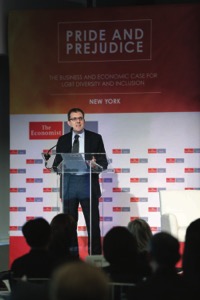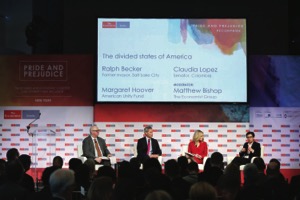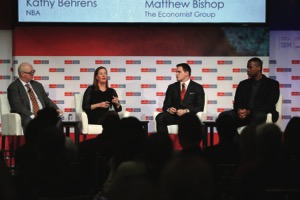
Thursday, March 23 at 10 on the Park at Time Warner Center in midtown Manhattan, some of the most forward thinking business leaders, athletes, social activists and others will converge for the second annual “Pride and Prejudice: The Business Case for LGBT Diversity and Inclusion.” The all-day event, which is being hosted by The Economist, begins in Hong Kong, continues in London and concludes in New York, and hopes to amplify the role business plays in pushing a more socially progressive agenda both here and abroad.
The idea that businesses would be at the forefront of social change is not new. Being a socially responsible corporate citizen has shown to be beneficial to the bottom line and, in an era of globalism, a useful tool in recruiting the best and brightest from a staggering applicant pool. But by simply implementing gender neutral bathrooms, or explicitly anti-gay harassment policies, are businesses doing enough to push forward policies that can exact progressive outcomes? The answers are mixed. Take North Carolina. Despite numerous sports franchises, businesses and musicians pulling out of the state over their transgender bathroom bill (which forbids a person from using the bathroom most closely aligned with their gender identity), the law remains in place.
We had the chance to speak with Matthew Bishop, senior editor of the Economist Group, about the next iteration of business activism and what he, and by extension, The Economist, hope to see as a natural outgrowth of this cross-section of talent. (This interview has been slightly redacted.)

San Diego LGBT Weekly: What was the genesis of last year’s conference?
Matthew Bishop: At The Economist, we’ve always had a belief, even going back to our founding in 1843, that economic progress and social progress go hand in hand and a liberal tolerant society is going to be more productive and more successful; and that’s been our mission as we think of intelligent policies around that area.
In 1996, I think we were the first major publication to put up the case for gay marriage on the cover…way ahead, I think, of general thinking in that area. And a few years ago there was the gay marriage legislation and that process toward the Supreme Court. And it struck us as a major fault line in the world, a major test between, you know, a litmus test of whether a country was going to be an open, global, progressive country or a closed, conservative, not-progressing country. And so the new editor-in-chief came in and said: “Look, we should make this one a campaign issue [and] we’re going to use all the resources of the Economist Group, whether with the editorial, or the magazine, or the conference business or any other research we have to help advance the case – the business case, the economic case not just the human rights case for LGBT inclusion.
And a conference was suggested by our Asian colleagues. And so we decided to do this roving 24-hour conference that starts in Hong Kong, goes through London and then ends up in New York. And last year went very well and we’re hoping in 2017 we’ll have much more impact than we did even last year.

Was what you were hoping would come out of that conference, what you saw? And what did come out of that conference?
I think it was interesting. So one of the things we feel we could do at The Economist that maybe it’s harder for other leading companies to do because we have such a reach into the kind of mainstream influence of policymaker, business leader, community is to get people who don’t normally get onto public platforms and talk about LGBT inclusion, to get out there and speak. ([This year] we have the president of Qantas, the head of the C.I.A., the head of The World Bank.) You know we thought that was very important so we got a lot of positive feedback from the people who took part. They felt they encouraged their support for this in a way they had never done before in many cases. And it stimulated more conversation within their companies.
Also, and somewhat unexpectedly, we livestreamed on Facebook and actually found we broke all records for anything like that on social media. And we were reaching a lot of people that we probably wouldn’t have reached – especially young people – as easily. And we really found a tremendous desire there for serious conversation. [For example], how do you create an inclusive culture? How do you give voice to people who are being marginalized? And so, in that sense, it’s been very positive.
Do you feel that this is the next iteration of the civil rights arc? I mean, only ten years ago, it was still a pretty big deal for major brands to have LGBTQ-inclusive policies. But now you’re seeing a level of activism and I’ll give you an example: PayPal deciding not to put a call center in North Carolina over the state’s HB 2 legislation. That isn’t something you’ve seen much of until recently. Do you feel that that is where business is moving?

That’s a very, very interesting question. I mean, if you look at last year, one of the things that came out of the research that we showcased at the conference was: If you take a mainstream western corporation – and maybe Asia is bit further behind continental Europe and America – nowadays, the head office, with a few notable exceptions, is basically talking really impressive, progressive language about inclusion.
But you notice the further you get from the head office, it appears you go out into areas where maybe the culture is not as inclusive, whether it be parts of certain American states or whether it be in Africa or parts of Africa, you’re getting differences in all the head offices doing what they’re doing on the ground and there are a lot of internal challenges. But, obviously, also some of the recent religious legislation and the transgender bathroom legislation has politicized a bunch of American companies and organizations.
The question we’re looking at this year, one of our big themes – is how does business actively be a catalyst for change? Does business have the courage to stand up? Now, you see, watching all these business leaders go and kowtow to Trump in Washington and you wonder if they’re really going to have the nerve to stand up and fight him the way they did in North Carolina?
So, I think there is a big opportunity for business, which has become the most progressive force, or one of the most progressive forces, in society. And because business is fundamentally in it to make money, there’s an inclusive culture. Yet it’s often the most dynamic and productive culture. So if you’re trying to win the war for top talent you want to create an inclusive culture, you want to reach the maximum number of customers, you tend to want a brand that is able to talk authentically to LGBT people.
Facebook will be livestreaming all three events. For more information, visit the Pride and Prejudice Web site here.











